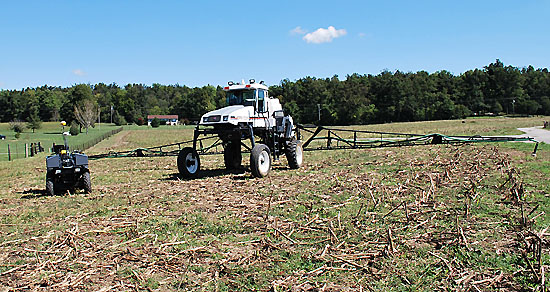Equipment upgrades to enhance UK College of Agriculture research
Equipment upgrades to enhance UK College of Agriculture research

In the past year, the University of Kentucky Research and Education Center in Princeton has made substantial technology upgrades to the center’s equipment to help further its research mission.
These upgrades include an improved farm record keeping system and precision agriculture instruments on a sprayer, a tractor, a combine and an all-terrain vehicle.
The sprayer was purchased through funds from the Kentucky Corn Growers’ Association, Kentucky Soybean Board and the Kentucky Agricultural Development Fund. The other equipment upgrades were funded through the center.
“We are extremely appreciative of the support we received from the Kentucky Corn Growers Association, the Kentucky Soybean Promotion Board and the Kentucky Agricultural Development Board, and the confidence these important stakeholders have placed in us,” said Richard Coffey, the center’s director. “This is a great example of how cooperation between the UK College of Agriculture and our stakeholders can help meet the needs of our clientele.”
UK College of Agriculture researchers have conducted studies in the past using various precision agriculture technologies at the center, but this year is the first time the new technologies are available to every researcher who has plots on the research farm and research plots on Western Kentucky producers’ farms.
“The biggest way I can see this helping with research is our researchers can more precisely repeat an experiment,” said Joe Williams, the center’s farm superintendent. “In the past, we were able to accurately replicate a long-term study within inches; now it will be within centimeters.”
Researchers and farm staff now have real-time, online access to the farm’s records, including field history, which will help them resolve land use issues. In addition, researchers can see when farm personnel make nutrient and chemical applications throughout the growing season, as well as how their research plots yielded at harvest.
Additional benefits include lower fuel costs and time saved applying chemicals and nutrients.
Biosystems Ag Engineering Extension Research

